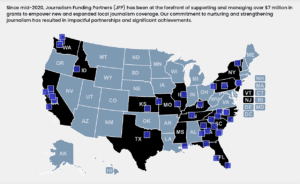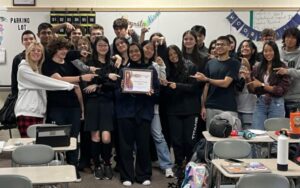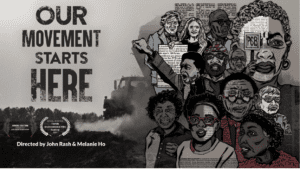By Eric Frederick, NC Local newsletter editor
They can have global consequences, but elections are local — and their integrity depends on the dedication of administrators, employees and volunteers, and the local journalists keeping an eye on the processes.
For those of us watching the watchers as county election boards canvassed and reported their results over the past few days, their work has been enlightening, and inspiring. And it isn’t over. The biggest thread yet to be tied — pun intended — is in the race to be the state’s chief justice, where a recount must be finished in the next week.
We’ve learned a lot more along the way. Nick Ochsner‘s reporting for WBTV has led to a State Board of Elections review of irregularities at an Anson County voting site. We’ve seen useful analysis, such as this scrutiny of notable shifts in sentiment around the state by Paul Woolverton and Brian Gordon in The Fayetteville Observer. And we saw a very human lesson in integrity, too:
Sara Knotts, like thousands of election administrators throughout the country, is extraordinarily devoted to her duty. But after her mother voted by mail and then died before Election Day, few have had their allegiance to democracy tested as emotionally as Knotts.
“I couldn’t even bring myself to start doing the briefings on the challenges and I couldn’t figure out why. Then I opened the folder, saw her name and realized I had been putting it off” —Danielle Battaglia of The News & Observer and Emily Featherston of WECT tell a story of love, loss and fidelity.
Speaking of what we’ve learned…
I asked two questions last week of a few folks who were involved in reporting the voting. A week ago I shared their thoughts on what the media should do now. This week, the second question: What should the NC media have done better? Here are their answers, edited for length:
Anoa Changa, attorney, electoral justice reporter for Prism, host of the podcast “The Way with Anoa” and host of Scalawag’s “As the South Votes” video series:
(Journalists should be) centering the needs and concerns of the communities (they) serve. Media can go a long way to debunking disinformation and helping to keep the electorate informed and engaged. I think NC media can just keep moving toward reclaiming space as the fourth estate and really prioritizing what’s good for democracy over everything else.
Finally, having meaningful and representative coverage of the diverse groups and constituencies in NC is important. There has been some of this, but it can always be better.
Tazeen Dhanani, communications director, speaking for the Southern Coalition for Social Justice:
The media did a good job of setting expectations that results could take a while, not rushing to call anything and doing their best to explain the process of what was happening …
Additionally, we are seeing a continued shift to people voting earlier and voting by mail – which the pandemic certainly influenced – especially in states like North Carolina. When it came to covering candidates and issues, a lot of news outlets still treated it like Election Day with candidate Q&As, specific issues, etc., running in the last few days before Nov. 3, but too late to really educate and inform the majority of voters.
Cory Vaillancourt, reporter, Smoky Mountain News:
The reporters I worked with all year long … went above and beyond the call of duty, literally putting themselves in the line of fire (virus, rubber bullets, right-wing anti-media conspiracy theorists) day after day…
It’s not about what North Carolina media should have done better — it’s about better support for independent media from the general public. Want more/better coverage? Support your local news media outlet. Want more misinformation, disinformation, foreign meddling, conspiracy theories, unfounded rumors and fear-mongering? Well, how’s that been working out for us all so far?
Lynn Bernstein, founder, Transparent Elections NC:
The news media should do more research into the public observation laws and ballot processing laws in North Carolina rather than just relying on county election directors. …
As far as public observation goes, the election laws are really clear about this, but reporters did not let the public know what their rights were to observe…
“We’re still letting (politicians) set the terms of the narrative’ — Jordan Wilkie
Jordan Wilkie, elections integrity/open government reporter, Carolina Public Press:
We knew exactly what would happen post-election. We should have gotten our politicians on the record about understanding what would happen and when they’d have final answers, and had them tell us what they would do in such a situation.
We did a terrible job of calling politicians out on lying, which they did with great frequency in their press releases.
We also did a bad job of talking to our readers, understanding their needs and concerns, and bringing those directly to our politicians. We’re still letting (politicians) set the terms of the narrative, rather than allowing our readers to be the ones who set the news cycle and create the flow of information.
Dawn B. Vaughan, government/politics reporter, The News & Observer and The Herald-Sun:
We have to cover the presidential candidate visits, but because there were so many of them, that took coverage time away from more issue-related and down-ballot races stories. Still, I think we all did a good job of making sure the best coverage of NC politics came from NC media.
Also in this week’s newsletter: good work from Mary C. Curtis, AVL Watchdog, Cardinal & Pine and The Daily Tar Heel, and a Q&A with WUNC’s Anita Rao. Sign up to get NC Local in your inbox every Wednesday.




